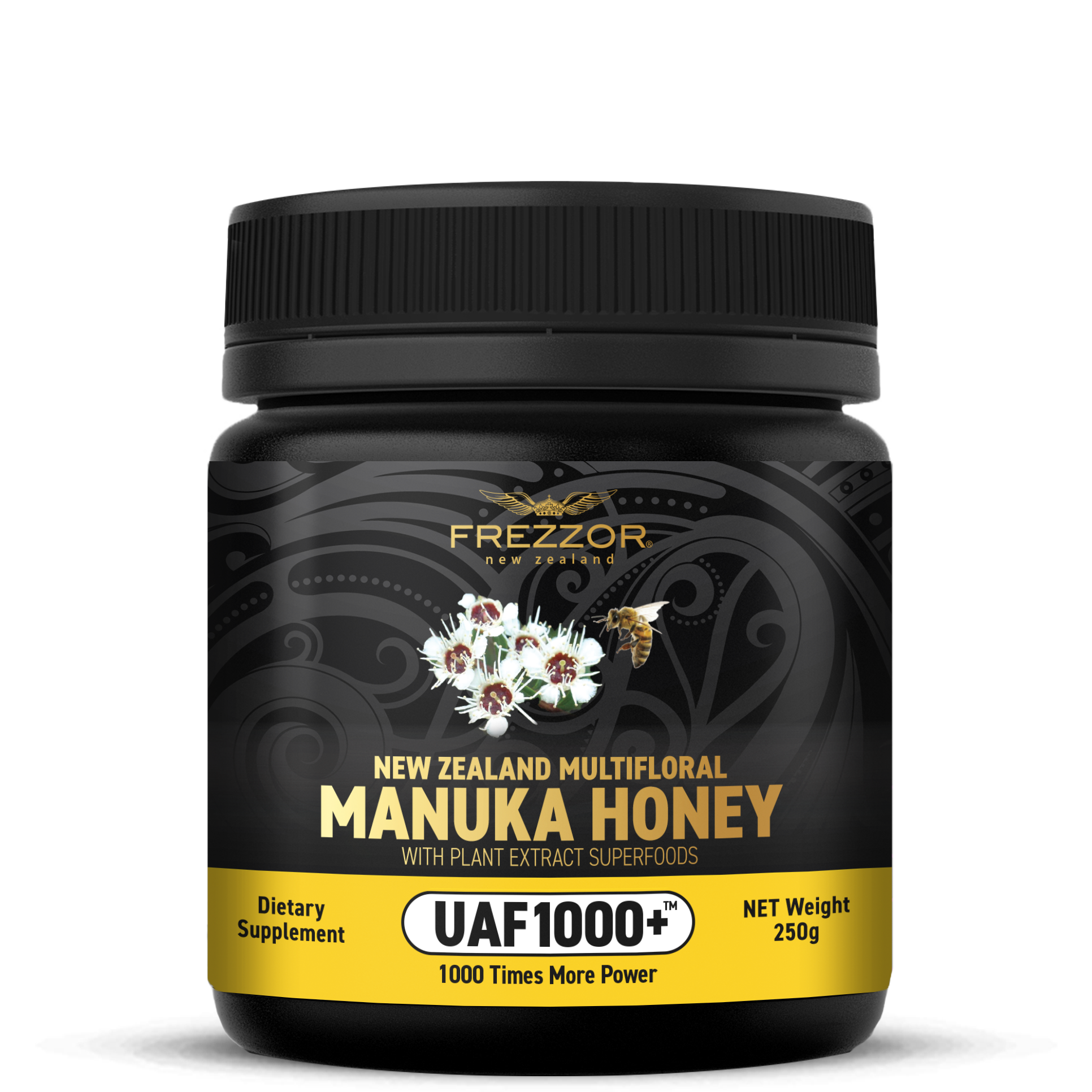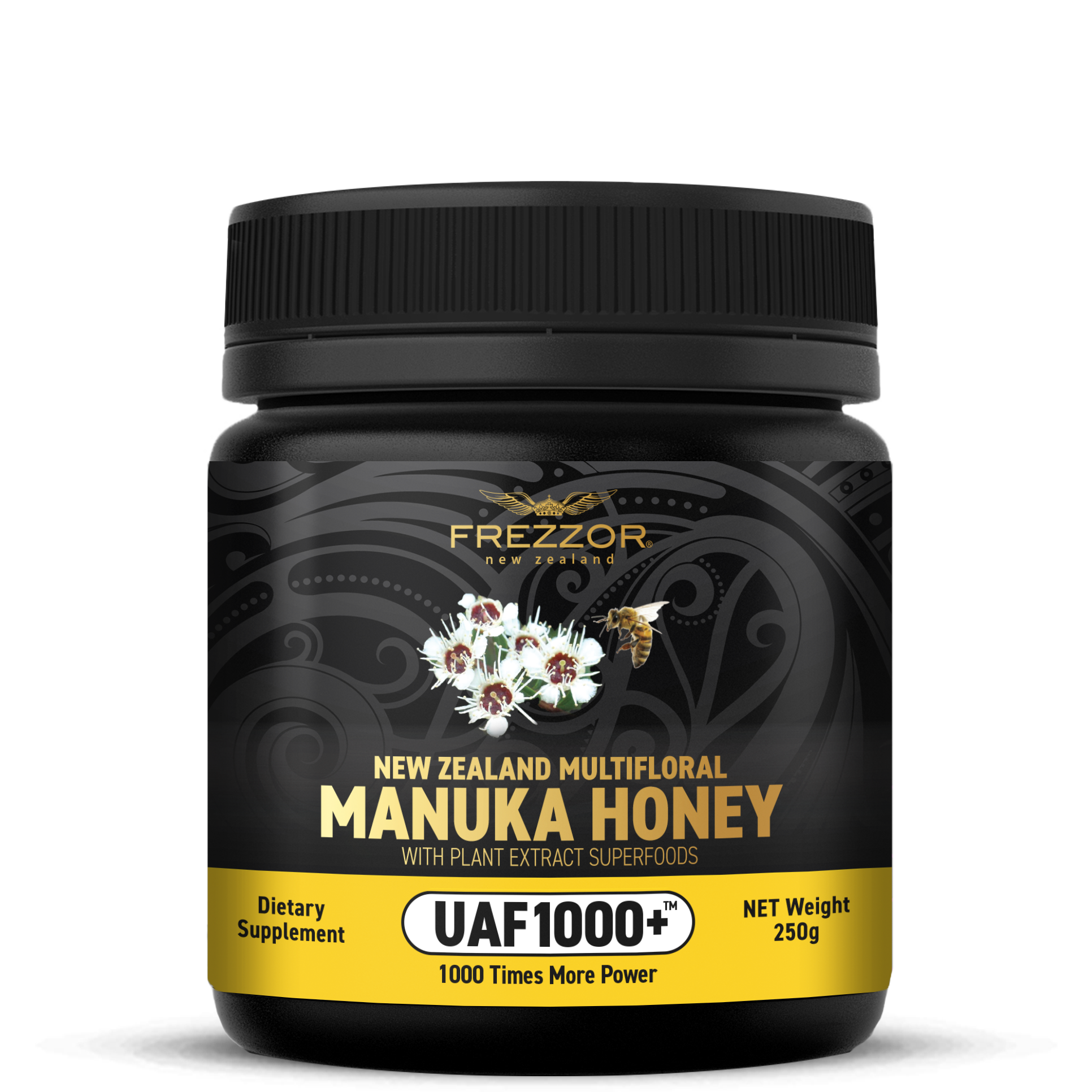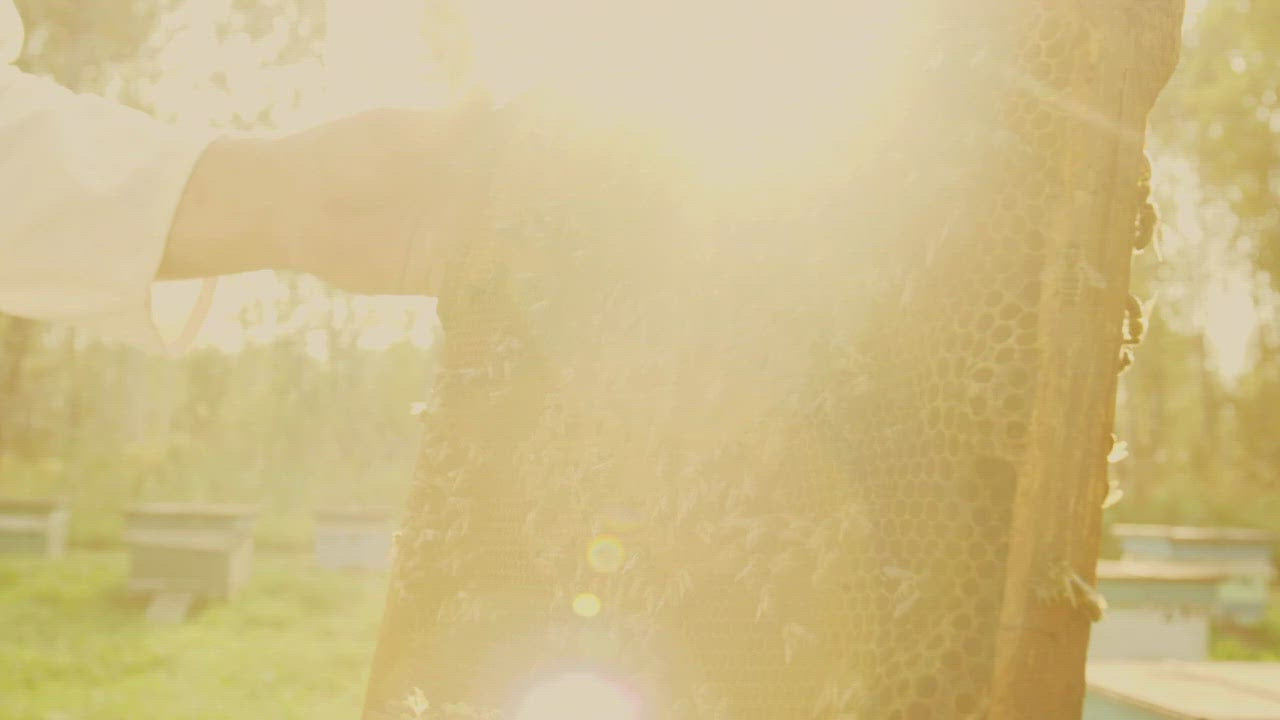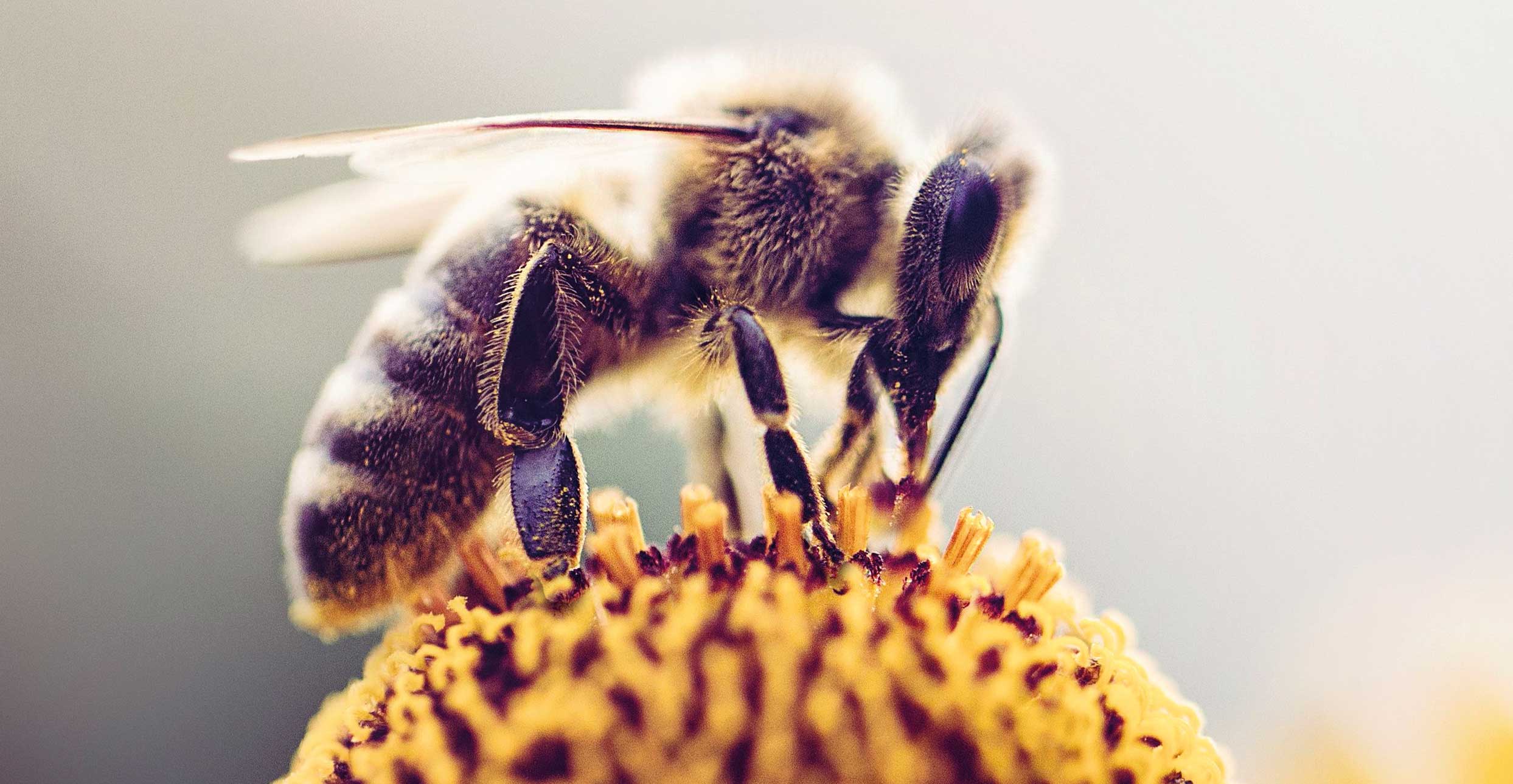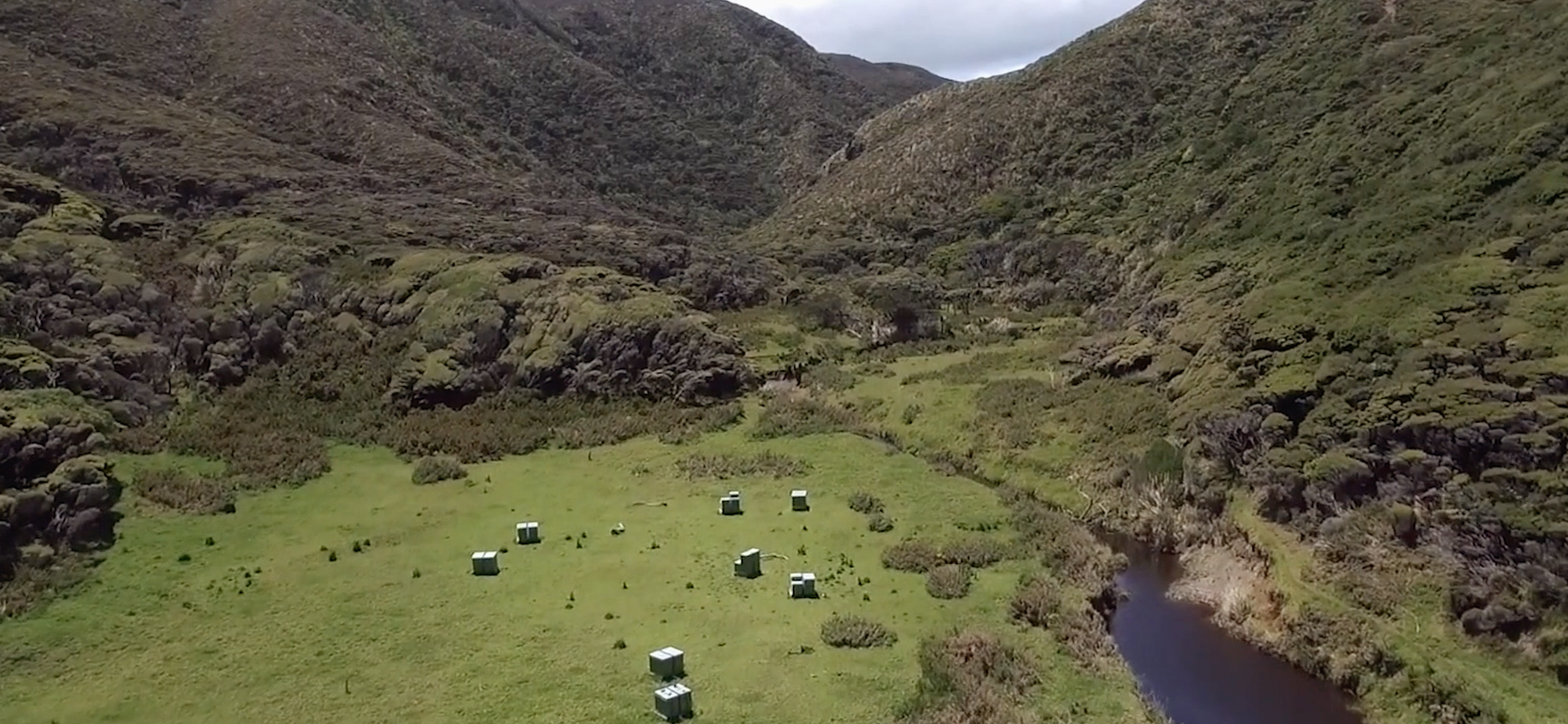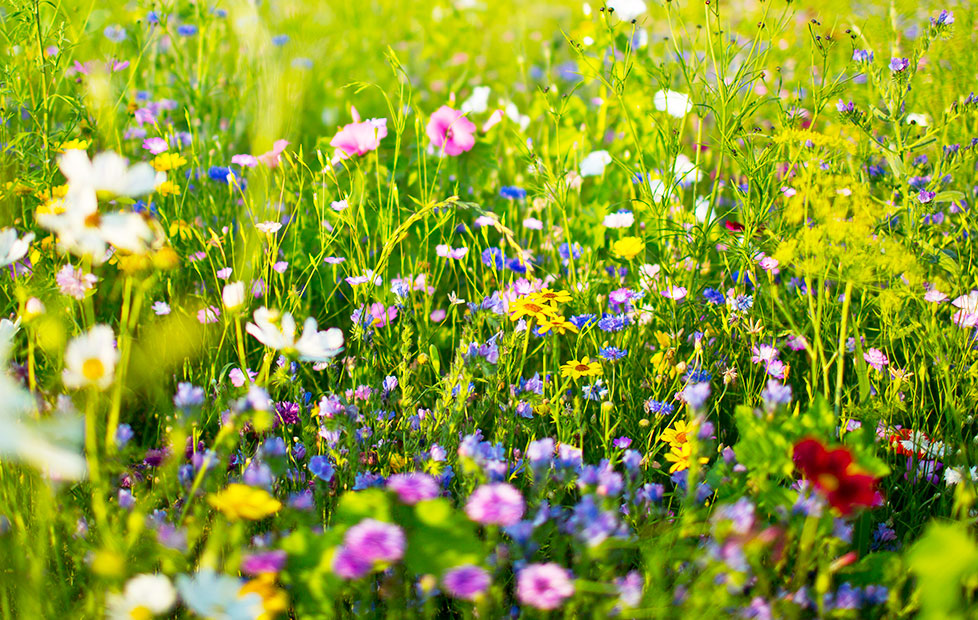
What is Multifloral Manuka Honey?
Multifloral Manuka Honey is a perfect blend of active New Zealand Manuka honey and wildflower, or other native New Zealand honey. Multifloral Manuka Honey results in a delicate and smooth flavour, which can be can be enjoyed in several ways.
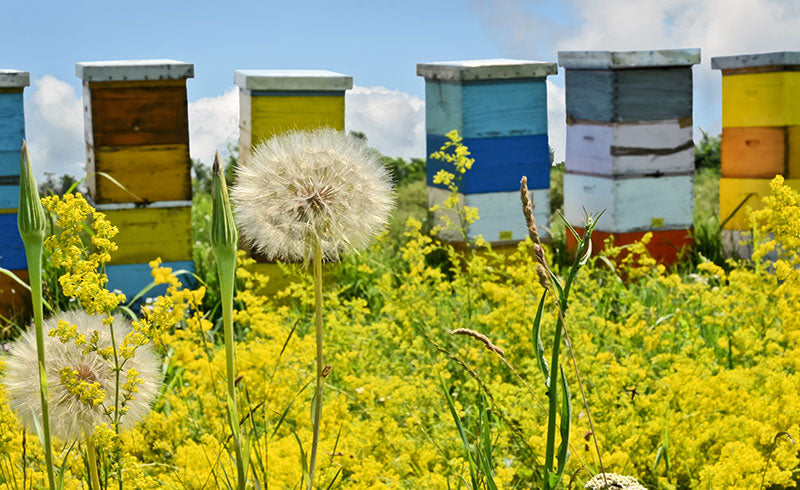
FREZZOR MULTI FLORAL MANUKA HONEY UAF1000+® was formulated to offer those who wanted the experience and benefits of Manuka Honey but at a more affordable price.
This blend of Manuka and other native New Zealand wildflowers provides a rich, exotic flavor, unlike any other floral honey, while still offering a wide range of health benefits such as natural immunity, gut health and general wellness.
FREZZOR MULTIFLORAL MANUKA HONEY has a smoother and creamier texture and is slightly more free-flowing than standard manuka honey.
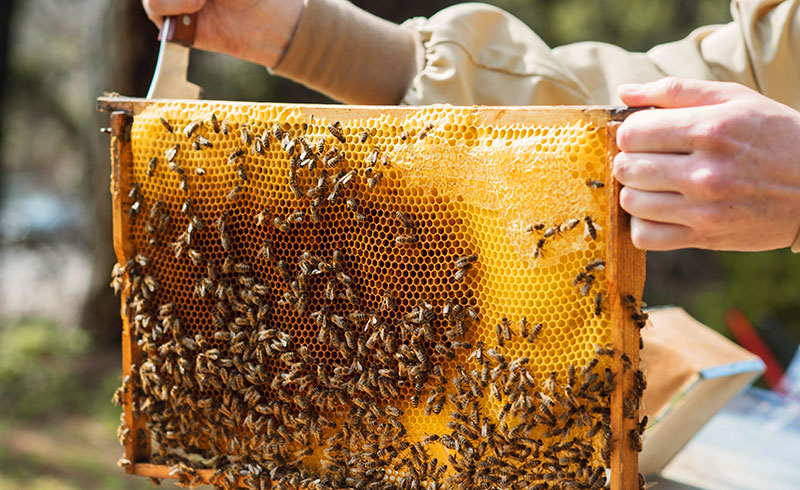
Sustainable
Sustainability is fundamental to us, and therefore we are committed to protect and preserve our beautiful clean green New Zealand. Our products are 100% sustainable.
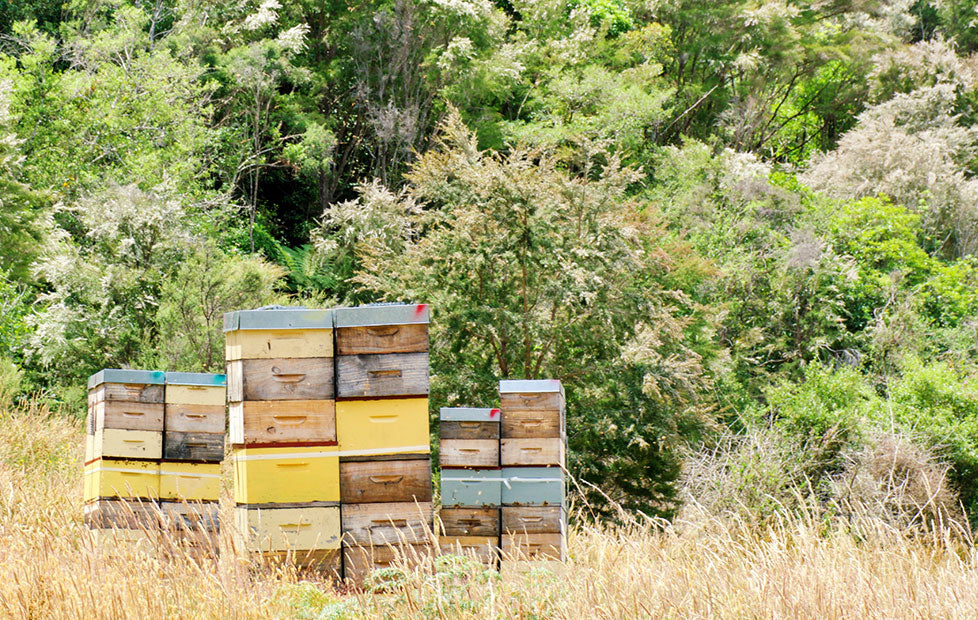
Traceability
All our Manuka and Multi-Floral honey is collected from beekeepers who harvest honey exclusively for FREZZOR. We not only track the individual hives that our honey comes from but we also track the geolocations of native bush that our hives are established in.
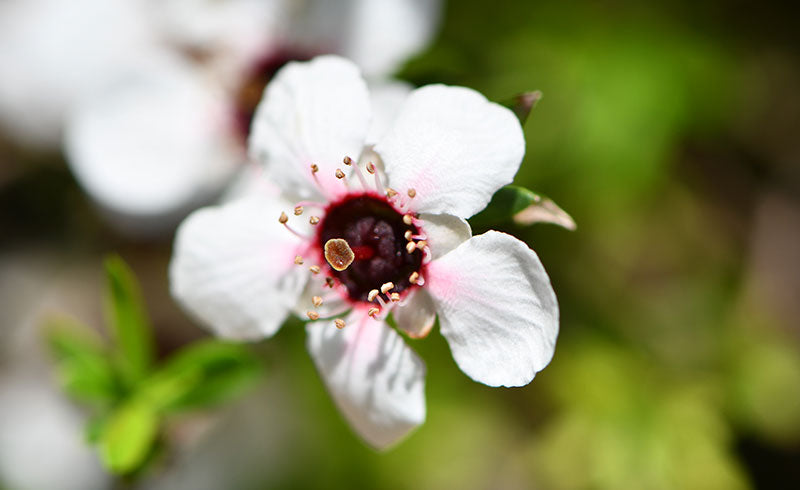
FREZZOR MULTI FLORAL MANUKA HONEY UAF1000+® from New Zealand's remote pollution-free wild native Manuka flower is globally renowned for its superior health benefits.
FREZZOR proprietary formula of 7 super-potent plant polyphenols and minerals blended with NZ Manuka Honey to create UAF1000+® "Ultimate Antioxidant Factor 1000+" supports digestive health, stomach ailments, immune system, respiratory system, bacterial balance, relief of coughs and sore throats.
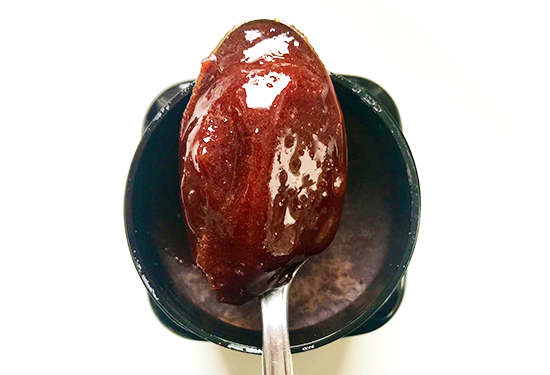
Manuka honey has received a tremendous amount of recognition and now is much more popular than most other types of honey. Many sources list the benefits of this type of honey as being that it is antibacterial, antiviral, antifungal, anti-inflammatory, anti-allergenic and immune-stimulating. It is even being used to treat wounds and cuts. These are all correct, but they are only some of the many benefits that manuka honey has.
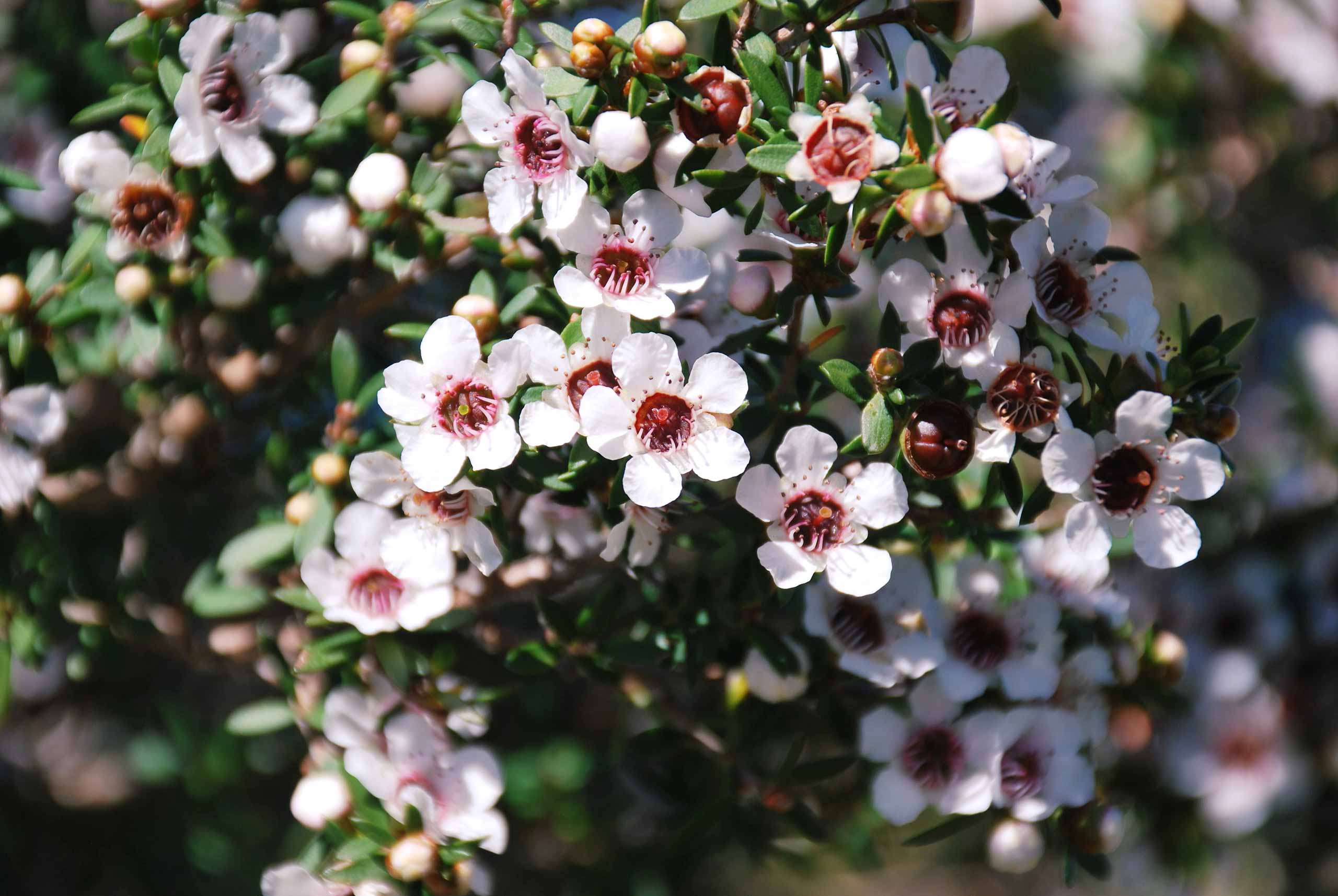
Manuka honey has been used in hospitals. They use it to treat wounds and cuts that have become resistant to healing and subject to frequent re-infection. It is also used for any types of skin issues such as eczema and psoriasis. This type of honey's antibacterial properties is very effective in treating these conditions because it can be applied with the risk of someone being resistant to antibiotic treatment.
- The world’s most biologically active
- 100% premium raw New Zealand manuka honey and multifloral honey
- Combined with the NZ grown, plant and fruit extracts of UAF1000+®
- UAF1000+® greatly improves the health benefits of the raw manuka
- Promotes oral & digestive health
- Supports a well-balanced inflammatory response
- 39% more effective at reducing inflammation than other manuka honeys
- Harvested from our own FREZZOR hives
- Tested, certified, and packed in New Zealand
- Vegetarian, non-dairy, GMO-free, gluten-free
FAQ
FREZZOR Multifloral Manuka Honey UAF1000+®
What is Manuka?
The Manuka bush grows mainly in the remote mountainous regions of New Zealand. The manuka plant belongs to the myrtle family and is rich in essential oils. The leaves and bark of this tea tree species have been used for centuries by the Maori, the indigenous people of New Zealand, as a remedy to soothe wounds and gastrointestinal diseases. The fact that valuable honey could also be produced from the flowers was discovered long afterwards, namely when honey bees were settled in New Zealand in 1840. Until then, only wild bees were native to New Zealand. The flower nectar of the Manuka bush is remarkable and now the rest of the world has also recognized the amazing effect of Manuka honey against bacteria, viruses and fungi. FREZZOR multifloral manuka honey also contains New Zealand wildflower honey.
How is multifloral manuka honey obtained?
Multifloral Manuka Honey means that nectar is collected by bees from many different types of flowers with a significant amount of manuka flower nectar. To obtain true wildflower honey with a percentage of manuka, hives are placed close to wildflower meadows that are in full bloom, close to manuka bushes but away from typical agricultural landscapes and non-domesticated crops. Bees fly to the wildflowers and manuka flowers in the near vicinity of the hive to harvest the nectar from this diverse flora for a true multiflora manuka honey. Wildflowers, including the manuka shrub are plants that grow in a natural environment not influenced by humans. And this is usually where the difficulty of wildflower honey begins. Humans have altered large landscapes and made them usable through agriculture, so the occurrence of true wildflower honey has become rather rare. However, it is different in New Zealand, where there are vast areas of untouched nature.
What makes FREZZOR Multifloral Manuka Honey UAF1000+® so special and unique?
FREZZOR Multifloral Manuka Honey UAF1000+® is a New Zealand wildflower honey with a measurable amount (MGO between 70 and 100) of Manuka. This honey is harvested, bottled, packaged and certified in New Zealand, which guarantees that it is genuine New Zealand multifloral manuka honey. We combine this honey with UAF1000+® plant extracts.
What does UAF1000+® mean?
UAF1000+® means "Ultimate Antioxidant Factor 1000+" and refers to the extra powerful plant extracts that are part of Noel Turner's unique formulation. This powerful prebiotic, antioxidant "superfood blend" consists of extracts of blackcurrant, kiwi, boysenberry, grape seed, red grape skin and pine bark, with which we fortify our multiflora Manuka Honey. The result is a honey pot packed with antioxidants, vitamins and minerals. Our FREZZOR multifloral manuka honey is a valuable nutritional supplement due to the UAF1000+® plant extract enhancement.
How do you know it's real, pure New Zealand Manuka Honey?
Unfortunately, there is far more Manuka Honey sold around the world than can be produced in New Zealand. The reason for this is simply that when Manuka Honey is packaged outside of New Zealand, it is usually "foreign" lower quality honey that is mixed in with the Manuka Honey. This is very important for our customers to know, as these mixtures often do not meet expectations in terms of quality. FREZZOR multiflora manuka honey is harvested, bottled, packaged and certified in New Zealand, guaranteeing that it is genuine New Zealand multiflora manuka honey. So if you want to buy real Manuka honey, it must be certified, bottled and packaged in New Zealand.
What is the difference between monofloral and multifloral Manuka honey?
Manuka honey can only be called "Manuka honey" if it is "monofloral", meaning the majority of the honey comes from the Manuka flower. Honey labeled "multifloral Manuka honey" comes primarily from other flowers, but also contains a proportion of Manuka honey (MGO between 70 and 100). We refine our FREZZOR multifloral manuka honey UAF1000+® with Noel Turner's plant extract blend UAF1000+®, which has been shown to further enhance the effectiveness of FREZZOR multifloral manuka honey.
What are the properties of FREZZOR multifloral manuka honey?
Normally multifloral manuka honey is rather liquid but the combination with the plant extracts UAF1000+® gives it a rather thick consistency.
It has a rosewood tone due to the addition of the UAF1000+® plant extracts. In addition, the manuka bush may have white, pink or red manuka flowers with pollen of varying lightness. As FREZZOR multifloral manuka honey UAF1000+® is a pure natural product, the shade may well vary a little with each new batch, but this does not affect the quality of the honey. Our FREZZOR multifloral manuka honey is not overheated.
What is the taste of FREZZOR Manuka Honey?
Manuka honey generally has a slightly stronger flavor than regular honey. The combination of FREZZOR multifloral manuka honey with UAF1000+® plant extracts gives it a sweet, floral, but also slightly tart flavor.
How can you recognize real New Zealand Manuka Honey?
Many customers ask about the quality of our UAF1000+® Manuka Honey because very often they can't see through the jungle of information about Manuka Honey. At FREZZOR, we've been thinking about how we can clear up the confusion around the different factors when buying Manuka Honey, so we got the answer straight from New Zealand from our beekeeper Murray, who produces our Manuka Honey locally.
Murray tells us the following, "All genuine, New Zealand Manuka honeys have a special activity that makes Manuka honey unique and a powerful superfood and skin care product. Currently, there are five descriptions used to identify this special manuka activity, along with different numbering systems, all of which are correct in their own way, but rather confusing to many consumers. A simple activity comparison is the methylglyoxal value, which can be easily compared to other activity descriptions using comparative graphs. While very high activity manuka honey is great for external wound and skin care, some people find it too intense to consume on a daily basis. For daily consumption that still provides all the benefits of Manuka, we recommend and offer genuine, certified New Zealand Manuka Honey with methylglyoxal levels tested between 85 and 250."
Does real multiflora Manuka honey have to be certified?
Yes, in order to be called Manuka Honey or Multifloral Manuka Honey, it must be certified by the New Zealand Ministry. We only offer certified New Zealand Manuka Honey that is also harvested, tested, bottled and packaged in New Zealand, which guarantees that it is genuine New Zealand multiflora Manuka Honey. Like all other packaged New Zealand Manuka Honeys, our FREZZOR Multifloral Manuka Honey has been tested and certified by independent laboratories to MPI NZ Manuka Standards. MPI is New Zealand's Ministry of Primary Industries, responsible for domestic food regulation and import/export. Certification of a Manuka Honey by MPI NZ Standards certifies that it has passed as genuine Manuka Honey and has been previously tested based on natural compounds and DNA specific to Manuka Honey.
Is Manuka honey a healthy alternative to table sugar?
We are comparing regular household sugar to Manuka honey to determine if honey is a healthy alternative to industrial sugar. Normal household sugar is a dual sugar. This is composed of two simple sugars, namely glucose (dextrose) and fructose (fruit sugar). Manuka honey also consists of glucose and fructose, but also minerals, vitamins, water, methylglyoxal (MGO), amino acids, polyphenols, flavonoids, phenolic acids, lipids and enzymes. In terms of calories, the two sweeteners differ only slightly, but at the same time the proportion of fructose in honey is somewhat higher than in table sugar and therefore honey tastes somewhat sweeter. As a result, less honey is needed to sweeten food and calories can be saved. Unlike table sugar, Manuka honey is a natural, raw, unprocessed sweetener and also has antibacterial properties. That's why you should prefer Manuka honey over table sugar for sweetening. You can even add Manuka Honey to hot drinks, because the ingredient Methylglyoxal contained in Manuka Honey is largely heat resistant.
Can children also consume Manuka honey?
Yes, infants may consume Manuka honey without hesitation, provided they have reached the age of 1. Babies under one year of age are at risk of botulism, so consumption must be avoided. As we enhance FREZZOR Manuka Honey with plant extracts and it is therefore classified as a food supplement, please read the consumption recommendation on the label.
What is the best way to store Manuka Honey and what is its shelf life?
Honey in general has a virtually indefinite shelf life when stored properly, even if a best before date is listed. If you store Manuka Honey away from light, in a cool, dry place, it will not crystallize and will retain its original consistency. Valuable ingredients are also protected when stored properly and will be preserved for a long time. The dark color of the container for our Manuka Honey, guarantees a certain light protection, which is very important for storage. Honey and also salt are two foods that do not automatically become inedible after expiration and can still be eaten well after that.
Why do we use plastic containers for FREZZOR multifloral Manuka Honey?
Genuine Manuka Honey is certified and bottled in New Zealand according to strict guidelines and controls. The packaging is also subject to these strict guidelines and must be classified as food safe and harmless according to international food standards in order to be able to use it. So we only pack in containers that are approved for food. Manuka honey from New Zealand is shipped all over the world. Glass containers are more expensive to produce and would add to the already extremely high transportation costs because of their weight. Because we try to offer our customers a price advantage, and also because glass containers are not suitable for long distance transportation due to their susceptibility to breakage, we use dark plastic containers for our UAF1000+® Multifloral Manuka Honey. The dark color of the container for our Manuka Honey, guarantees a certain light protection, which is very important for storage. We ask our customers to recycle these plastic containers after consuming the Manuka Honey.

